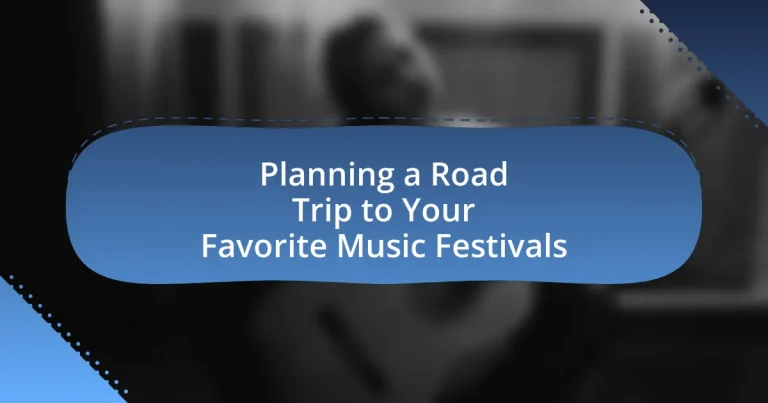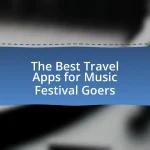The article focuses on the essential steps involved in planning a road trip to music festivals, emphasizing the importance of selecting festivals, determining routes, budgeting, and vehicle preparation. Key factors for choosing festivals include artist lineups, location, and personal budgets. The article outlines practical steps for creating a travel itinerary, packing essentials, and ensuring vehicle readiness, while also addressing common challenges such as navigation issues and accommodation shortages. Additionally, it provides strategies for maximizing the festival experience and maintaining a positive group dynamic during the trip.
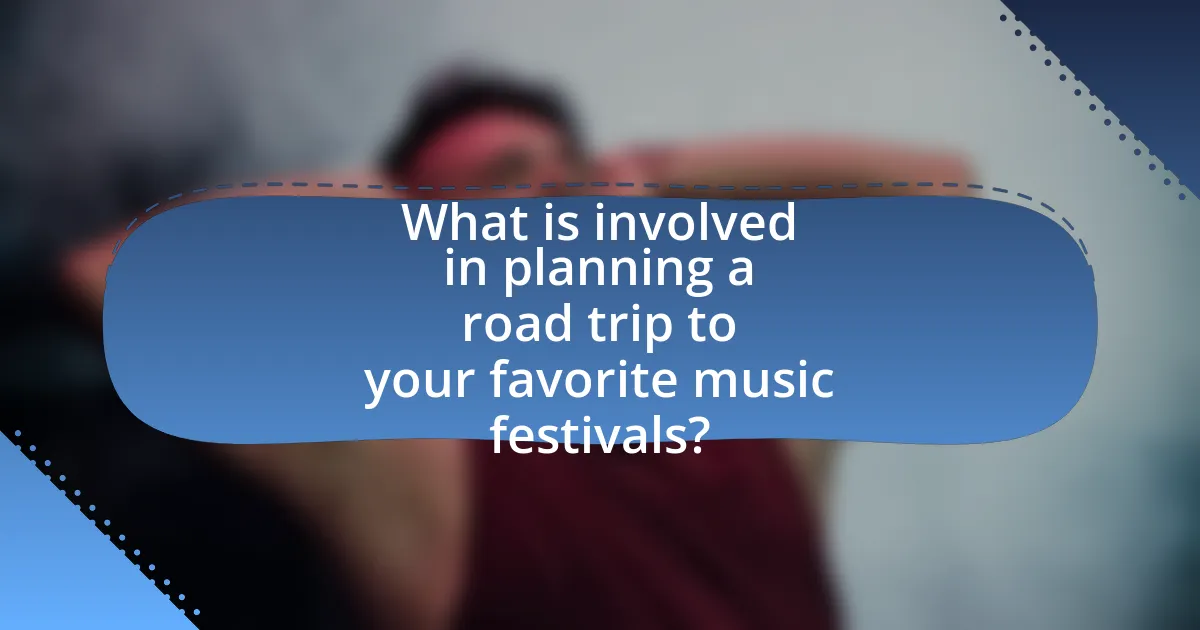
What is involved in planning a road trip to your favorite music festivals?
Planning a road trip to your favorite music festivals involves several key steps: selecting the festivals, determining the route, budgeting, and preparing for the trip. First, identify the music festivals you want to attend, considering their dates and locations. Next, map out the driving route, taking into account distances and travel times between festivals. Budgeting is crucial; calculate costs for gas, accommodations, food, and festival tickets. Finally, prepare your vehicle for the journey, ensuring it is in good condition, and pack essentials such as camping gear, clothing, and supplies. These steps ensure a well-organized and enjoyable road trip experience.
How do you choose which music festivals to attend?
To choose which music festivals to attend, evaluate factors such as the lineup of artists, location, dates, and personal budget. The lineup is crucial because attending festivals featuring preferred artists enhances the experience; for instance, festivals like Coachella and Lollapalooza attract top-tier talent. Location matters as it affects travel logistics and costs; festivals closer to home can reduce expenses. Dates should align with personal schedules to ensure availability, while budget considerations include ticket prices, accommodation, and travel costs. According to a survey by Eventbrite, 78% of festival-goers prioritize artist lineups when selecting events, highlighting the importance of this factor in decision-making.
What factors should you consider when selecting a festival?
When selecting a festival, consider factors such as location, lineup, budget, and amenities. The location impacts travel logistics and accessibility, while the lineup determines the artists and genres featured, influencing your overall experience. Budget considerations include ticket prices, accommodation, and travel expenses, which are crucial for financial planning. Amenities such as food options, facilities, and safety measures enhance comfort and enjoyment. Research shows that attendees prioritize these factors to ensure a fulfilling festival experience, with 70% of festival-goers indicating that artist lineup is the most critical factor in their decision-making process.
How do location and lineup influence your festival choice?
Location and lineup significantly influence festival choice by determining accessibility and the appeal of performing artists. A festival’s location affects travel logistics, accommodation options, and overall convenience, making it more likely for attendees to choose events that are geographically favorable. For example, festivals held in major cities often attract larger crowds due to better transportation links and amenities. Additionally, the lineup, which includes the artists and bands performing, directly impacts the desirability of the festival. Festivals featuring popular or trending artists tend to draw more attendees, as fans prioritize seeing their favorite performers live. According to a survey by Eventbrite, 78% of festival-goers stated that the lineup is a crucial factor in their decision-making process. Thus, both location and lineup are critical in shaping festival attendance.
What are the essential steps in planning your road trip?
The essential steps in planning your road trip include determining your destination, creating a route, budgeting for expenses, preparing your vehicle, and packing necessary items. First, identify the music festivals you want to attend and their locations. Next, use mapping tools to outline the most efficient route, considering stops along the way. Budgeting involves estimating costs for fuel, accommodations, food, and festival tickets, ensuring you have sufficient funds. Vehicle preparation includes checking oil, tires, and brakes to ensure safety and reliability. Finally, pack essentials such as clothing, camping gear, and festival necessities to ensure a comfortable experience.
How do you create a travel itinerary for your road trip?
To create a travel itinerary for your road trip, start by determining your destination and the music festivals you plan to attend. Next, outline your route, including key stops for sightseeing, rest, and meals. Incorporate travel times between locations, ensuring you allocate sufficient time for each festival and any activities you want to enjoy along the way. For example, if attending a festival in Nashville, you might plan to visit landmarks like the Country Music Hall of Fame en route. Finally, compile all this information into a structured document or app, detailing dates, addresses, and contact information for accommodations and festival venues. This organized approach ensures a smooth and enjoyable road trip experience.
What tools can help you map out your route effectively?
GPS navigation apps such as Google Maps and Waze can help you map out your route effectively. These tools provide real-time traffic updates, route optimization, and estimated arrival times, ensuring that travelers can navigate efficiently to their destinations. According to a study by the American Automobile Association, using GPS navigation can reduce travel time by up to 20% by avoiding congested areas and suggesting alternative routes.
What should you pack for a music festival road trip?
For a music festival road trip, you should pack essentials such as clothing suitable for various weather conditions, camping gear, food and snacks, hydration supplies, personal hygiene items, and festival tickets. Clothing should include comfortable outfits, a rain jacket, and sturdy footwear, as festivals often involve long hours outdoors. Camping gear like a tent, sleeping bag, and portable chairs is necessary if you plan to camp. Food and snacks should be easy to transport and consume, while hydration supplies, including water bottles or hydration packs, are crucial for staying hydrated. Personal hygiene items like wet wipes, hand sanitizer, and sunscreen are important for maintaining cleanliness and skin protection. Lastly, ensure you have your festival tickets and any necessary identification readily accessible.
What are the must-have items for comfort and convenience?
Must-have items for comfort and convenience during a road trip to music festivals include a comfortable sleeping bag, portable charger, and a cooler for food and drinks. A comfortable sleeping bag ensures restful sleep during camping, while a portable charger keeps devices powered for navigation and communication. A cooler maintains food and beverages at optimal temperatures, enhancing the overall experience. These items are essential for a successful and enjoyable road trip, as they directly contribute to comfort and convenience on the journey.
How can you prepare for varying weather conditions?
To prepare for varying weather conditions during a road trip to music festivals, travelers should pack versatile clothing and gear suitable for different climates. This includes waterproof jackets, layers for warmth, and breathable fabrics for heat. Additionally, checking weather forecasts regularly allows for timely adjustments to plans and packing. According to the National Weather Service, being informed about local weather patterns can significantly enhance safety and comfort during outdoor events.
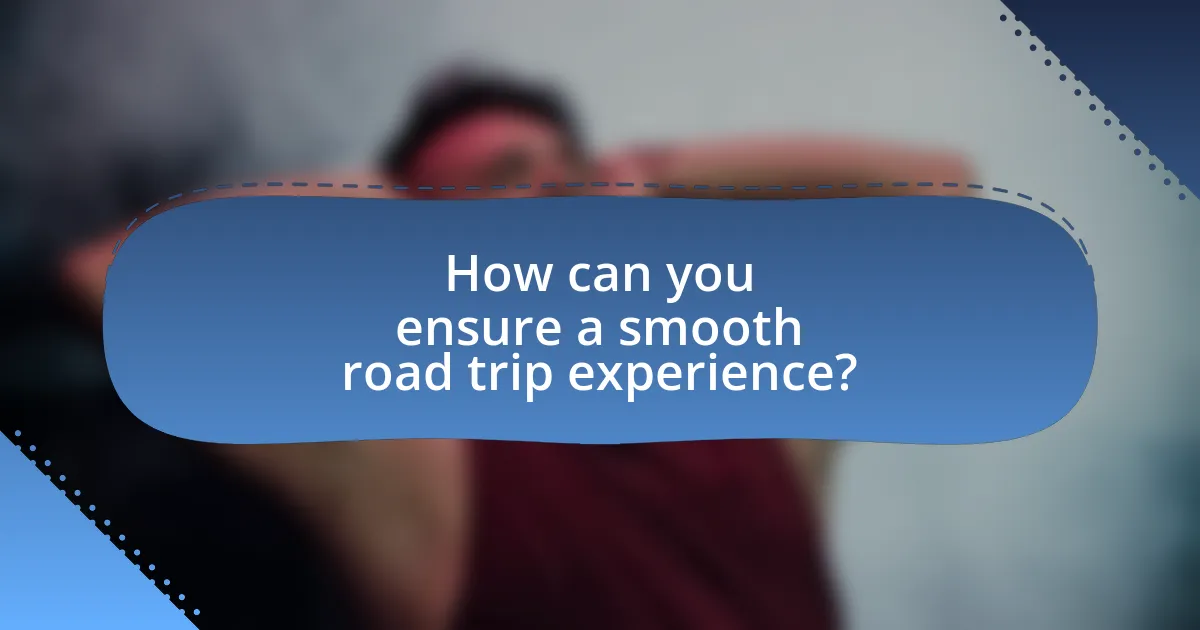
How can you ensure a smooth road trip experience?
To ensure a smooth road trip experience, thorough planning is essential. This includes creating a detailed itinerary that outlines your route, stops, and accommodations. Researching traffic patterns and weather conditions can help avoid delays, while booking accommodations in advance ensures you have a place to stay. Additionally, preparing your vehicle by checking tire pressure, oil levels, and ensuring all fluids are topped off can prevent mechanical issues. According to the American Automobile Association, regular vehicle maintenance can reduce the risk of breakdowns by up to 50%. Having a backup plan, such as alternative routes and emergency contacts, further enhances your preparedness for unexpected situations.
What are the best practices for vehicle preparation?
The best practices for vehicle preparation include conducting a thorough inspection, ensuring proper maintenance, and equipping the vehicle with necessary supplies. A thorough inspection involves checking tire pressure, fluid levels, brakes, lights, and wipers to ensure safety and functionality. Regular maintenance, such as oil changes and filter replacements, enhances vehicle performance and reliability. Additionally, equipping the vehicle with emergency supplies, such as a first aid kit, spare tire, and basic tools, prepares drivers for unexpected situations. These practices are essential for a safe and enjoyable road trip experience, particularly when traveling to music festivals where long distances and varying road conditions may be encountered.
How do you perform a pre-trip vehicle inspection?
To perform a pre-trip vehicle inspection, systematically check key components of the vehicle to ensure safety and functionality. Start by examining the tires for proper inflation and tread depth, as under-inflated or worn tires can lead to blowouts. Next, inspect the brakes for responsiveness and wear, ensuring that brake fluid levels are adequate. Check the lights, including headlights, brake lights, and turn signals, to confirm they are operational, as visibility is crucial for safety. Additionally, review fluid levels such as oil, coolant, and windshield washer fluid, as low levels can cause engine overheating or visibility issues. Finally, ensure that the battery terminals are clean and secure, as a weak battery can lead to starting problems. Following these steps helps prevent breakdowns and enhances safety during the trip.
What emergency supplies should you carry in your vehicle?
You should carry a first aid kit, flashlight, jumper cables, tire repair kit, water, non-perishable food, and a blanket in your vehicle for emergencies. These supplies are essential for addressing common roadside issues such as medical emergencies, vehicle breakdowns, and adverse weather conditions. For instance, a first aid kit can provide immediate care for injuries, while jumper cables can help restart a dead battery. Having water and non-perishable food ensures hydration and sustenance during unexpected delays. According to the American Automobile Association (AAA), being prepared with these items can significantly enhance safety and comfort during road trips.
How can you manage your budget for the trip?
To manage your budget for the trip, create a detailed budget plan that outlines all expected expenses, including transportation, accommodation, food, and festival tickets. This approach allows for better tracking of spending and helps identify areas where costs can be reduced. According to a survey by the American Automobile Association, travelers can save up to 30% by booking accommodations in advance and utilizing budget-friendly transportation options. By setting a clear budget and adhering to it, you can ensure that your trip remains financially manageable while still enjoying the music festivals.
What are the key expenses to consider when budgeting?
Key expenses to consider when budgeting for a road trip to music festivals include transportation costs, accommodation, food, festival tickets, and miscellaneous expenses. Transportation costs encompass fuel, vehicle maintenance, and potential rental fees, which can vary based on distance and vehicle type. Accommodation expenses involve hotel or camping fees, which can fluctuate based on location and duration of stay. Food costs should account for meals on the road and at the festival, with budgeting for both dining out and groceries. Festival tickets represent a significant expense, often requiring early purchase for the best prices. Lastly, miscellaneous expenses may include parking fees, merchandise, and emergency funds, which are essential for unexpected costs.
How can you save money on accommodations and food?
To save money on accommodations and food during a road trip to music festivals, consider camping at festival sites and preparing your own meals. Camping often costs significantly less than hotel stays, with many festivals offering affordable camping options. Additionally, cooking your own meals can reduce food expenses, as dining out at festival venues typically incurs higher prices. For example, a study by the American Camping Association indicates that camping can save families an average of 50% on lodging costs compared to hotels. By combining these strategies, travelers can effectively lower their overall expenses while enjoying the festival experience.
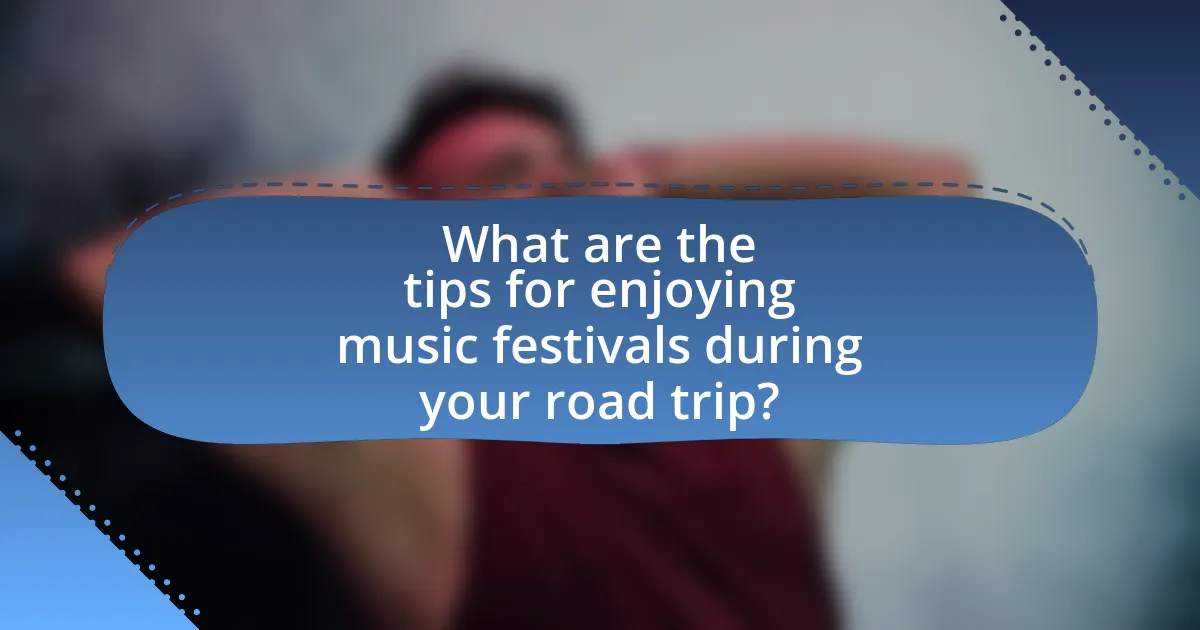
What are the tips for enjoying music festivals during your road trip?
To enjoy music festivals during your road trip, plan your itinerary around festival dates and locations to maximize your experience. Research the festival lineup and schedule in advance to prioritize must-see performances, ensuring you allocate time for travel and rest. Additionally, pack essentials such as comfortable clothing, hydration supplies, and camping gear if necessary, as many festivals offer camping options. It’s also beneficial to download festival apps for real-time updates and maps, which enhance navigation and help you stay informed about any changes. Lastly, consider traveling with friends to share costs and enhance the overall enjoyment of the experience.
How do you maximize your festival experience?
To maximize your festival experience, plan ahead by researching the lineup, scheduling your days, and securing accommodations early. This preparation allows you to prioritize must-see performances and avoid last-minute stress. According to a study by Eventbrite, attendees who plan their festival itinerary in advance report a 30% higher satisfaction rate compared to those who do not. Additionally, arriving early can enhance your experience by giving you time to explore the venue, discover food options, and engage with fellow festival-goers.
What strategies can help you navigate large crowds?
To navigate large crowds effectively, individuals should employ strategies such as maintaining a clear path, using landmarks for orientation, and staying aware of crowd dynamics. Maintaining a clear path involves moving with purpose and avoiding sudden stops, which can disrupt the flow of people. Utilizing landmarks helps individuals orient themselves and find exits or meeting points, reducing anxiety in crowded environments. Staying aware of crowd dynamics, including recognizing when to move with the crowd or when to find an alternative route, enhances safety and efficiency. These strategies are supported by studies indicating that awareness of surroundings and purposeful movement can significantly reduce stress and improve navigation in crowded situations.
How can you make the most of the festival lineup?
To make the most of the festival lineup, prioritize your favorite artists and create a schedule that allows you to see their performances. By reviewing the lineup in advance, you can identify key acts and plan your day around their set times, ensuring you don’t miss any must-see performances. Additionally, consider factors such as stage locations and potential overlaps in set times to optimize your experience. Researching artist backgrounds and setlists from previous shows can also enhance your enjoyment and help you discover new music.
What are the common challenges faced during a road trip to music festivals?
Common challenges faced during a road trip to music festivals include vehicle breakdowns, navigation issues, and accommodation shortages. Vehicle breakdowns can occur due to long distances and heavy traffic, leading to delays and increased costs. Navigation issues arise from unfamiliar routes or poor signal reception, complicating travel plans. Accommodation shortages often happen as many attendees seek nearby lodging, resulting in limited options and higher prices. According to a survey by Eventbrite, 60% of festival-goers reported difficulties in finding suitable accommodations, highlighting the prevalence of this challenge.
How can you handle unexpected changes in plans?
To handle unexpected changes in plans during a road trip to music festivals, remain flexible and adapt quickly to new circumstances. This involves reassessing your itinerary, considering alternative routes or accommodations, and maintaining a positive attitude to manage stress. Research shows that adaptability is a key trait in successful travelers, as it allows for a more enjoyable experience despite unforeseen challenges. For instance, a study published in the Journal of Travel Research highlights that travelers who embrace change report higher satisfaction levels during their trips.
What should you do if you encounter vehicle issues on the road?
If you encounter vehicle issues on the road, first safely pull over to the side of the road to avoid traffic hazards. Once stopped, assess the situation to determine the nature of the problem, such as a flat tire, engine trouble, or overheating. If you are unable to resolve the issue, contact roadside assistance or a towing service for help. According to the American Automobile Association (AAA), approximately 32 million drivers rely on roadside assistance services annually, highlighting the importance of having a plan in place for vehicle emergencies.
What are the best practices for a successful road trip to music festivals?
The best practices for a successful road trip to music festivals include thorough planning, vehicle preparation, and packing essentials. First, planning involves selecting the festival, mapping the route, and scheduling stops for rest and food, which enhances safety and enjoyment. Vehicle preparation requires ensuring the car is in good condition, including checking oil, tires, and brakes, as breakdowns can lead to missed performances. Packing essentials means bringing camping gear, food, water, and festival tickets, which are crucial for comfort and access. According to a survey by Eventbrite, 70% of festival-goers emphasize the importance of preparation for a positive experience, highlighting that organized trips lead to greater enjoyment and fewer issues.
How can you maintain a positive group dynamic during the trip?
To maintain a positive group dynamic during the trip, establish clear communication and set shared goals among group members. Clear communication fosters understanding and minimizes conflicts, while shared goals create a sense of unity and purpose. Research indicates that groups with defined objectives experience higher satisfaction and cohesion, as seen in studies on team dynamics in collaborative settings. By encouraging open dialogue and collective decision-making, the group can navigate challenges effectively, enhancing the overall experience of the road trip to music festivals.
What are the key takeaways for future road trips to music festivals?
Key takeaways for future road trips to music festivals include thorough planning, budgeting, and safety considerations. Planning involves selecting the festival, mapping the route, and scheduling stops for rest and meals. Budgeting should account for fuel, accommodation, food, and festival tickets, ensuring financial preparedness. Safety considerations encompass vehicle maintenance, packing emergency supplies, and adhering to local traffic laws. These practices enhance the overall experience and minimize potential issues during the trip.
